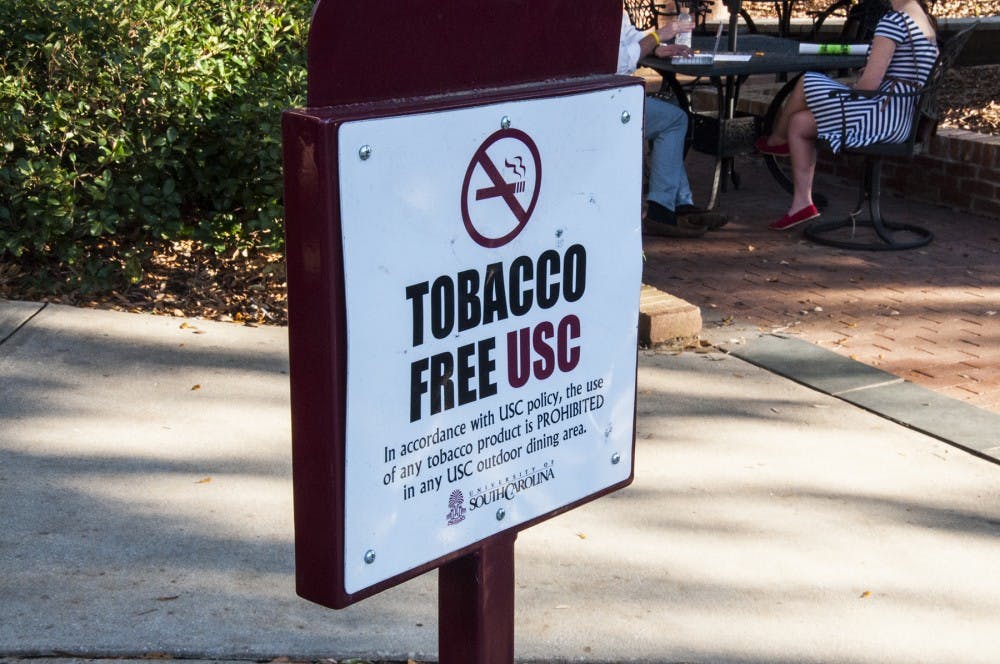After a year as a tobacco-free campus, Dennis Pruitt, vice president for student affairs and vice provost and dean of students, is planning to move into the assessment phase to see how this policy change has impacted the university community and to see “how our culture has changed.”
This assessment phase will examine how many students and employees have taken advantage of smoking cessation and see if secondhand smoke has been reduced, among other things. Healthy Carolina will be conducting a full survey of students, faculty and staff regarding the effects of the policy in 2015.
However, Jessica Johnston, director of Healthy Carolina, has already seen the impact of the change. In a spring 2014 wellness survey, 84 percent of faculty and staff members reported that they felt the policy has been effective.
“There has been an obvious reduction in the use of tobacco on campus from before the policy implementation January 2014 to now. This has come through personal testimony, feedback from faculty, staff and students and from the monitoring of hot spots on campus where smokers would congregate,” Johnston said in an email. “The air is clearer at USC. We are also aware of many individuals who have quit smoking after the policy was implemented.”
According to Pruitt, one of the biggest benefits of the tobacco-free policy on campus has been preparing students with habits they will use when they join the workforce.
“With thousands of colleges and universities, as well as thousands more cities and business adopting no tobacco practices, it is clear to me we are assisting our students to prepare for a workplace where the chances are they will NOT be allowed to use tobacco,” Pruitt said in an email. “So we trust students are developing good health habits to take with them into the workplace.”
Another benefit Pruitt and Johnston see in the tobacco-free policy has been the attention it gives to students’ health.
“We cannot do enough to teach our students how to avoid self-destructive behaviors, as well as behaviors that put others at risk,” he said. “Some of the positive aspects may not be seen for years — as we see yet further reduction of the bad outcomes of using tobacco.”
Specifically, Johnston believes that this ultimately saves the lives of students in the long term.
“The most positive aspect is the fact that we are impacting and saving lives long term by creating a culture of health and encouraging and providing resources for tobacco users to quit,” she said. "We also hear over and over how nice it is to have cleaner air with the reduction in the exposure to second hand smoke.”
Pruitt and Johnston recognize that the tobacco-free policy has not yet completely eliminated smoking on campus.
“Changing a campus culture, a workplace culture and individual behaviors is a long-term process, not one that is accomplished in 365 days,” Pruitt said.
In order to help make USC completely smoking free, Campus Wellness offers a tobacco cessation program, Carolina’s Tobacco Treatment Program, which provides one-on-one coaching. According to Campus Wellness director Michael Crowley, the program is “designed to assess an individual’s readiness to quit and provide them with the skills and resources to do so successfully.”
The pharmacy in Student Health Services also offers over-the-counter and prescription nicotine replacement options.
USC has also worked to encourage other campuses to make the same policy change, and has assisted other universities, including other USC regional campuses, to become tobacco-free. In October 2013, 31 colleges and universities attended the SC Tobacco-Free College and University Summit hosted by USC.
Johnston said that universities should consider this policy because health is directly linked to academic success and should have an emphasis on preparing students for the workforce, where she said individuals are incentivized for healthy lifestyles. According to Pruitt, USC was actually “a late adopter of this practice,” and many other universities have already recognized the potential benefits.
“The more communities that are tobacco-free the easier it is to change the social norm to one that eliminates second hand smoke and encourages tobacco users to quit,” Johnston said. “Universities have an opportunity to create an environment that promotes health and teaches students about healthy lifestyles.”

